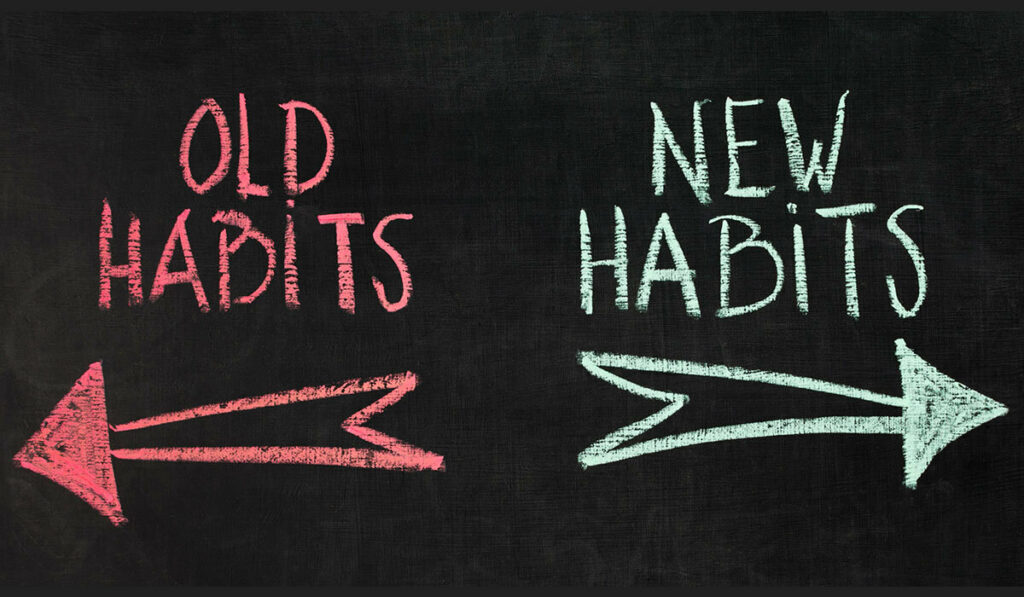Do you have healthy habits? Are you in complete control of them? Or do you have bad habits and it’s the other way around—they control you instead?
Your brain is only 2% of your body weight, but it uses 20% of your overall energy. For something that uses so much energy, it’s always looking for ways to do things easier. One way it does this is by forming habits. When you do something without even having to think about it, it’s because your brain has already been trained to do it, and it has formed it into a habit.
This can be a good thing. But sometimes, it can also be bad when you develop harmful habits. A personal example of this is looking at my phone. I pick it up when it alerts me with a notification or even when I’m just bored. I continue doing it often enough that my brain thinks, “This must be something he wants made into a habit.” Soon, I’m checking my phone every few minutes without knowing it. This might seem like a small thing, but this sort of behavior can create larger issues.
It’s very easy to fall into the trap that your brain has created for you, which often results in overuse of a product or service. It’s even easier when you don’t realize your own habits and those around you are creating habits for you. In the case of my phone, I wasn’t using it constantly but instead just checking it many times throughout the day because subconsciously, that’s what I felt I needed to do.
Social media has perpetuated this problem. People feel they need to constantly check Facebook or Instagram for updates or scroll aimlessly through their feed. They don’t have anything specific to do, but constantly check for something new to happen. With this sort of behavior, users are actually training themselves to have a steady stream of updates flowing through their mind, all day every day. It may not seem like it would be an issue, but the subconscious feelings that come with this thought process are likely negative, such as, “I wish people would contact me more often” or “I can’t wait until something interesting shows up on my Facebook feed.” A habit like this is only going to cause you anxiety because it really boils down to a lack of productivity and fulfillment in your life. Over time, this habit will get you to start thinking that it’s the only way to feel fulfilled and use your time. When you have a lack of fulfillment in your life, your brain will work overtime trying to find ways for you to fill the void.
The aforementioned examples are negative habits, but you can use the technique that created those same bad habits to train your brain to form positive habits instead. The secret is frequent predictable repetition.
For the longest time, I had struggledwith adding cardio into my routine. I always found an excuse or felt I didn’t have time for it. But the fact is I didn’t like doing it and only did it when I forced myself to, which was sporadically at best. I knew I had to build it into a habit if I was ever going to get consistent at it. So, I bought an exercise bike and placed it between my bed and my bathroom. Every morning before I showered, I would hop on my exercise bike for five minutes. “Five minutes?” you may ask. “What is the point? You can’t even get your heart rate up in that amount of time.” The point is to build the habit first through predictable repetition. I did this for 30 days. By that time, I didn’t even think about it in the morning –I just got on the bike. After the 30 days, I slowlyincreased by one minute each week until I hit my target of 30 minutes every day. After a few months, I had no problems adding intense cardio to my routine.
Now there are some caveats about doing this. First, if you decide to build healthy eating habits, be careful what you allow in your house. If all you have is junk food, then eventually those cravings will win out and break your newly formed healthy eating habit. Second, don’t let yourself break your good habit for anything less than a truly valid reason, like business travel or family emergency. If you do, your brain will reset and it will be that much harder to get back on track.
The science behind this method is called “functional fixedness,” which means that once our brain forms patterns, it starts to limit itself as it cannot see outside the box. If we disrupt this pattern by abruptly stopping our healthy habits or switching up our routine, then our brain will resume its usual function (bad habits).
Start with something small. The key here is that itshould be easy enough for you to maintain every day. Remember: it doesn’t have to be a big change to create a positive result. You just have to be consistent with it. For example, if you’ve never exercised in your life but resolve to practice yoga every day for an hour, chances are within the first week or two, you will simply become fatigued and not want to do it anymore. That’s setting yourself up for failure. But what if you only practiced yoga for 5 minutes a day, and then built it up to 10 minutes perday by the following week? You would still be building the habit of practicing yoga every day but at a more sustainable rate. So, “starting small” is all about keeping things achievable for you so that it can become an ongoing habit.
Beyond starting small, building habits into an existing daily routine is a great hack to ensure success. It’s called a “habit chain,” and it can help you create or break any habit.Integrating new habits into already-existing routinesis easier than trying to change everything at once. After waking up, take a shower and then read for 15 minutes. While cooking dinner, clean up some dishes at the same time.Every night after work, go for a short walk around your neighborhood to de-stress.
With habit stacking, you’re essentially creating new routines around old ones that you already do. If you keep going like this, pretty soon, you will have built a whole new set of healthy habits!



